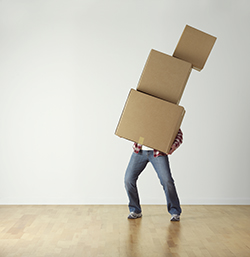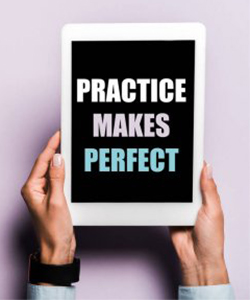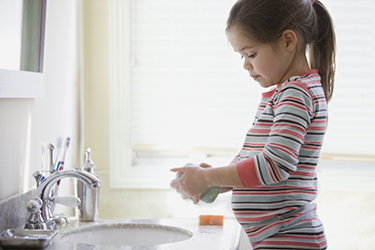Want to Live Smarter, not Harder?
In this section you will find tips to help busy parents feel more organized. Most experts agree that everyone can practice common-sense habits to organize their life. You may also ask yourself the question, "what is most important now?" Parents feel more organized when they know they are attentive to their family's needs and feel good about what they prioritize. How much you accomplish in your daily routine is important. Taking the time to teach your children to become "organized thinkers" is important too. Read more to find tips about:
Thoughts About Managing Your Life
Helpful Habits that Organized People Practice
Thoughts About Managing Your Life

What motivates you?
Most parents wish for:
1. Less stress
2. More time
3. More Sleep
4. Feeling more organized
Are you an organized thinker?
When you can see the big picture, you can plan a few steps ahead to simplify your busy day, and plan for tomorrow. This simple skill will help you feel like "I Got This! - everything is under control."
Are you too busy to enjoy your life?
Some parents are so busy being good parents, they do not have time to enjoy the time they spend with their children, and neglect taking care of themselves. You have an important job. Take care of yourself, so that you can continue to take care of your kids.
Do you spend enough time on what is most important to you?
Your priorities make life meaningful. Think of the things that you are most grateful for, like family (not things.) Is protecting your family's health and safety a high priority? If the answer is yes, schedule time each day to keep you family strong. That includes enough sleep, physical activity, eating and living well.
Need more tips on how to focus on what is most important? Learn more in Be the Parent You Want to Be and in our Resource section.
Helpful Habits that Organized People Practice
 In addition to organizing your thoughts and preventing health problems, experts recommend people practice habits to organize our lives. These habits help people manage their time, money, home.
In addition to organizing your thoughts and preventing health problems, experts recommend people practice habits to organize our lives. These habits help people manage their time, money, home.
Tips: Habits to Become More Organized:
Written Reminders
Everyone needs one place to keep appointments, schedules, and lists organized. The refrigerator door or a bulletin board organizer are popular locations. This approach will allow your family and friends to help keep your family on schedule. Better yet, it teaches your family the one place to look for appointment reminders, shopping, or "To Do" lists. Many people plan ahead and also set an alarm on their phone. Most importantly, don't keep it in your head!
Manage Your Time
Use this quote from Fred Rogers (Mr. Rogers) as a guide:
Do not Procrastinate
Did you know that 1 in 5 adults delay or avoid doing certain tasks? We do it for different reasons. Wonder why some people often arrive late for appointments? Maybe they don't think about how long it will take to get ready, and are late before they begin. Some people procrastinate :
- To avoid making a decision (worry they will make a bad decision)
- Believe they work best under pressure and will get it done at the last minute
TIP: If you plan or to set a goal, but have not taken action yet; schedule the day and time you can make it happen now. Want to get started on a healthy routine? Get ready to enjoy that walk or other goal.
Declutter
Organized people do not keep things that they no longer need. Do you have a space in your home where you can "clear the clutter" more often?
Tip to get started: Set an alarm for whatever time you can spare to begin to clean up a space. You will be amazed at what you can accomplish in one hour, or even 15 minutes.
Tips for parents use to teach their kids to declutter:
- You can teach your preschool age and older children how to "clear the clutter" when teaching them to help prepare foods in the kitchen and when cleaning up together after family meals.
- Set an alarm for 30 seconds or 1 minute at the end of playtime for a quick, fun clean-up session that will feel like a game. Challenge your kids to learn how much or who can do the best quick clean up at the end of playtime.
Tips to Manage your Paper
Try organizing paper into three categories based on how long you need it. Create files and label each as: Need Now, Need for a Short Time, Keep Forever. The papers you will need forever can be safely filed. Papers only needed now means they may need your attention now. Papers only needed for a short time will need resorting in a few weeks or months.
Helping Kids Get Organized

Organized kids grow into successful adults. Begin teaching kids about organization early in infancy and continue through their school and teen years. Make time to learn how parents may practice each step as their child grows at different ages and stages of development.
- Step 1: Be Consistent
- Step 2: Introduce Order
- Step 3: Give Everything a Place
- Step 4: Practice Forward Thinking
- Step 5: Practice Problem Solving
Step 1: Be Consistent (act the same way)
Most people know the foundation of parenting is consistency. Both kids and adults need to practice when learning every new skill. Learning how to behave needs practice. As a parent you will guide and redirect your child when needed. Celebrate and provide positive feedback when your child is learning to understand the expected behavior. Learn more about how parents help their infant, toddler, and preschooler when the parent is consistent.
Step 2: Introduce Order (about time and what comes next)
You can think of order as a series of steps. Every task has a beginning, a middle, and an end. You can help your child learn the idea in everyday conversations. You can describe this process to children as getting ready, doing the activity, and putting things away. Two examples of daily routines with a beginning, middle and an end:
- Mealtime: Prepare the food, enjoy the meal, and clean up the kitchen.
- Playtime: Set up the game, play the game, and put the toys away.
Learning about order includes two ideas we call sequence and time:
Sequence: Parents can teach kids sequence by adding words or labels:
- 1 2 3
- A B C
Time: Parents can teach kids about time with words like: later and soon, or yesterday, today, and tomorrow. Your preschooler is ready to understand the concept of time (more than 5 minutes) and location.
TIP: Do not give multiple warnings about time limits. Multiple warnings is a form of inconsistent parenting. (5 more minutes, followed by 5 more minutes is confusing.)
Step 3: Give Everything a Place (where to pub things): This teaches your child to recognize where things are and when they are needed. If you practice this habit, your infant will learn where they eat, and where they sleep. Preschool age (3-5 years) children are ready to apply this principle independently.
Step 4: Practice Forward Thinking (think about the future): Children have difficulty with this until about age four. Thinking about the future helps school age children learn to anticipate, predict, and plan. Parents can help their preschooler anticipate changes in schedules on weekends or scheduled days off.
Step 5: Promote Problem Solving (let you child learn to solve problems):
You can encourage your child to think about problems and solve them for herself. Don't solve problems for your child. You will teach other skills at the same time. An example includes teaching a child to be generous, or thinking about the family or the team—not just being a player, are two ways children can learn to be problem solvers. Being a kid that sometimes has "nothing to do" creates the opportunity for kids to develop this skill.
Remember if you teach your child to be a "big picture thinker" she will have the basic skills to develop an organized adult (just like you! Organized adults are also known as "Super-moms" or "Super-dads." Organized parents are great planners because they consider all the possibilities and make informed decisions.
Back to Top

